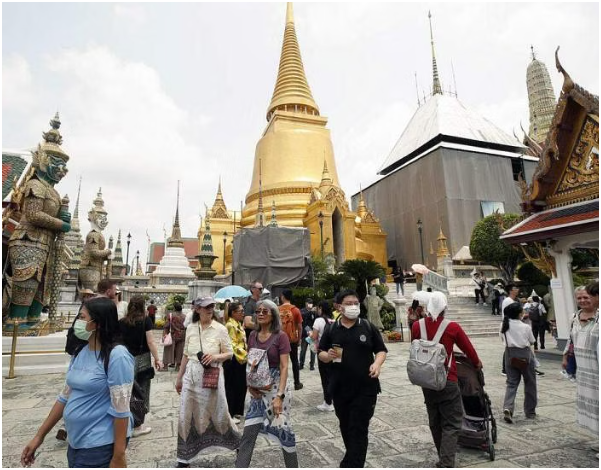Bangkok’s Heat Index Soars Past 52 Degrees Celsius, Urgent Warning Issued
As temperatures soar to unprecedented levels, Bangkok finds itself in the grip of an extreme heat emergency. With the heat index surpassing a staggering 52 degrees Celsius, authorities have issued a dire warning to residents and visitors alike. This article delves into the implications of Bangkok’s scorching heat, the factors contributing to the heatwave, and the urgent measures being taken to mitigate its impact on public health and safety.
Unprecedented Heatwave Grips Bangkok: Bangkok, known for its tropical climate, is accustomed to hot and humid conditions. However, the current heatwave has pushed temperatures to extreme levels, surpassing previous records and posing significant risks to public health and safety. The heat index, which factors in humidity levels to calculate the perceived temperature, has surged beyond 52 degrees Celsius, reaching levels deemed hazardous by meteorologists.
The scorching heatwave has brought about a slew of challenges for residents, including heat-related illnesses, dehydration, and discomfort. Vulnerable populations, such as the elderly, children, and outdoor workers, are particularly at risk of heatstroke and other heat-related ailments. Furthermore, the excessive heat can exacerbate existing health conditions and strain essential services, including healthcare facilities and emergency response teams.
Factors Contributing to the Heatwave: Several factors have contributed to the severity of Bangkok’s current heatwave, including climate change, urbanization, and air pollution. Climate change has led to rising global temperatures and more frequent and intense heatwaves, exacerbating heat-related risks in urban areas like Bangkok. Urbanization has further compounded the problem by creating heat islands, where densely built-up areas trap heat and exacerbate temperature extremes.
Air pollution, exacerbated by vehicular emissions, industrial activities, and deforestation, can exacerbate the effects of heatwaves by trapping heat and reducing air quality. This combination of factors creates a dangerous feedback loop known as the urban heat island effect, where cities experience significantly higher temperatures than surrounding rural areas.
Urgent Measures to Mitigate Heatwave Impact: In response to the extreme heat emergency, authorities in Bangkok have implemented urgent measures to mitigate its impact on public health and safety. These measures include public advisories, heatwave preparedness campaigns, and the establishment of cooling centers and shelters for vulnerable populations. Additionally, authorities have urged residents to stay hydrated, avoid outdoor activities during peak heat hours, and seek medical attention if experiencing symptoms of heat-related illness.
Efforts are underway to address the underlying factors contributing to the heatwave, including initiatives to reduce greenhouse gas emissions, promote green spaces and urban greening, and improve air quality through stricter emissions standards and pollution control measures. These long-term strategies aim to build resilience to heatwaves and create healthier and more sustainable urban environments.
Community Engagement and Resilience Building: Community engagement plays a crucial role in building resilience to extreme heat events and mitigating their impact on vulnerable populations. Public awareness campaigns, community outreach initiatives, and neighborhood-based interventions can empower residents to take proactive measures to protect themselves and their families during heatwaves. This may include distributing informational materials, conducting heat safety workshops, and mobilizing community resources to support those in need.
Moreover, fostering social cohesion and solidarity within communities can strengthen resilience to heatwaves by promoting mutual support networks and collective action. By working together to address common challenges and vulnerabilities, communities can better withstand the impacts of extreme heat events and emerge stronger and more resilient in their aftermath.
Bangkok’s current heatwave poses a severe threat to public health and safety, with temperatures soaring to unprecedented levels and the heat index surpassing 52 degrees Celsius. Urgent measures are being taken to mitigate the impact of the heatwave, including public advisories, heatwave preparedness campaigns, and the establishment of cooling centers for vulnerable populations. However, addressing the underlying factors contributing to heatwaves, such as climate change, urbanization, and air pollution, requires concerted efforts and long-term strategies. By promoting community engagement, resilience building, and sustainable urban planning, Bangkok can better adapt to the challenges posed by extreme heat events and create healthier and more livable cities for all residents.
In addition to immediate measures, ongoing research and data collection are crucial for understanding the complex dynamics of heatwaves and developing effective strategies for resilience and adaptation. Scientists and policymakers must work together to monitor temperature trends, assess the impacts of heatwaves on public health and infrastructure, and identify vulnerable communities at greatest risk. By leveraging data-driven insights, cities like Bangkok can better anticipate heatwave events, allocate resources more effectively, and implement targeted interventions to protect those most affected.
International collaboration and knowledge sharing are essential for addressing the global challenges posed by climate change and extreme weather events. Bangkok can learn from the experiences of other cities around the world that have successfully implemented heatwave mitigation strategies and adapted to changing climate conditions. By participating in international networks and initiatives focused on climate resilience and urban sustainability, Bangkok can access best practices, innovative technologies, and financial resources to support its efforts to address heat-related risks.
Stay informed with the latest updates-click here
